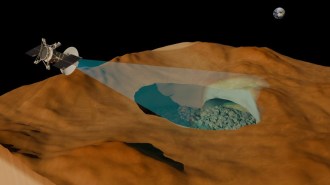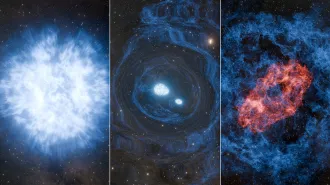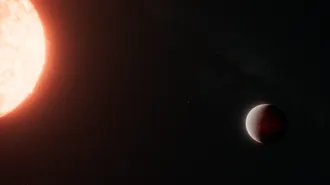Just as NASA was about to abandon efforts to contact the Mars Polar Lander spacecraft, which vanished last Dec. 3, a radio signal Jan. 4 buoyed hopes that the craft was still alive on the Red Planet. The changing pitch of the signal, the radio equivalent of a whistle, indicated it could have been sent by the craft’s transmitter as it was warming up (SN: 2/19/00, p. 120: A possible signal from Polar Lander).
After further analysis, however, NASA announced on Feb. 16 that the signal probably came from an Earthly source—possibly one of the components of the radio dish that detected it. Had the transmission come from Mars, its travels through interplanetary space would have significantly distorted it, adding many more frequencies to the original signal, says Sam Thurman, who served as flight operations manager for Mars Polar Lander at NASA’s Jet Propulsion Laboratory (JPL) in Pasadena, Calif. The purity of the tone points to a terrestrial origin.
What about the whistle, which seemed to have been produced by the lander’s radio transmitter warming up? “Unfortunately, transmitters on Earth can do that, too,” says Thurman. He told Science News that Stanford University researchers, who operate the radio dish, concur with JPL’s assessment. Admitting defeat, the space agency has no further plans to listen for the lander. Later this month, a NASA-appointed panel plans to release a report about the lost spacecraft, as well as a critique of the space agency’s beleaguered Mars program.
Meanwhile, JPL engineers are coming up with explanations for the bungled mission. For instance, a flaw in a sensor switch might have shut down the craft’s descent engines while the lander was still plunging through the Martian atmosphere, instead of when it touched the surface.
Lacking the means to brake, the craft would have suffered a fatal crash.







